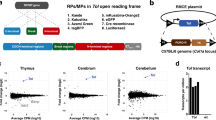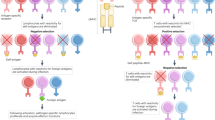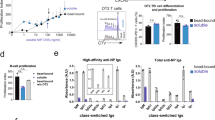Abstract
In mice, two sets of genes govern the immune response to the synthetic antigen GT. One maps to the major histocompatibility complex and behaves like a typical immune response gene. The second is a background gene encoding a cell surface structure found on B cells. Mice which express, and are therefore tolerant of, one form of this structure do not respond to GT. Thus, tolerance of self generates holes in the T-cell repertoire, partially crippling the immune system.
This is a preview of subscription content, access via your institution
Access options
Subscribe to this journal
Receive 51 print issues and online access
$199.00 per year
only $3.90 per issue
Buy this article
- Purchase on Springer Link
- Instant access to full article PDF
Prices may be subject to local taxes which are calculated during checkout
Similar content being viewed by others
References
Benacerraf, B. & McDevitt, H. O. Science 175, 273–279 (1972).
Schwartz, R. H. Adv. Immun. 38, 31–201 (1986).
Blomberg, B., Geckeler, W. R. & Weigert, M. Science 177, 178–180 (1972).
Cohn, M. et al. in The Immune System, Genes, Receptors, Signals (eds Sercarz, E. E., Williamson, A. R. & Fox, C. F.), 89–117 (Academic, New York, 1974).
Epstein et al. J. exp. Med. 163, 759–773 (1986).
Zinkernagel, R. M. & Doherty, P. C. Nature 248, 701–702 (1974).
Babbitt, B., Allen, P. M., Matsueda, G., Haber, E. & Unanue, E. R. Nature 317, 359–361 (1985).
Billingham, R. E., Brent, L. & Medawar, P. B. Phil. Trans. R. Soc. Lond. 239, 357–414 (1956).
Schwartz, R. H. Scand. J. Immun. 7, 3–10 (1978).
Matzinger, P. Nature 292, 497–501 (1981).
Clark, R. B. & Schevach, E. M. J. exp. Med. 155, 635–640 (1982).
Dos Reis, G. A. & Schevach, E. M. J. exp. Med. 157, 1287–1299 (1983).
Ishii, N., Nagy, Z. A. & Klein, J. J. exp. Med. 157, 998–1005 (1983).
Vidović, D., Klein, J. & Nagy, Z. A. J. Immun. 134, 3563–3568 (1985).
Taylor, B. A. in Origin of Inbred Mice (ed. Morse, H. C.) 423–438 (Academic, New York, 1978).
Dembić, Z., Bannwarth, W., Taylor, B. A. & Steinmetz, M. Nature 314, 271–273 (1985).
Lee, N. E. et al. J. exp. Med. 160, 905–913 (1984).
Marrack, P. & Kappler, J. Nature 32, 840–843 (1988).
Urba, W. J. & Hildemann, W. H. Immunogeneties 6, 433–445 (1978).
Zaleski, M. B. Immunogenetics 3, 226–238 (1974).
Debré, P., Waltenbaugh, C., Dorf, M. & Benacerraf, B. J. exp. Med. 144, 272–276 (1976).
Debré, P., Kapp, J. A., Dorf, M. E. & Benacerraf, B. J. exp. Med. 142, 1447–1454 (1975).
Cinader, B., Koh, S. W. & Naylor, D. Int. Archs Allergy appl. Immun. 35, 150–162 (1962).
Dorsch, S. & Roser, B. Nature 258, 233–235 (1975).
Gorczynski, R. M. & MacRae, S. J. Immun. 122, 747–752 (1979).
Prud'homme, G. J. et al. Immunol. Today 6, 160–162 (1985).
Prochazka, M., Leiter, E. H., Serreze, D. V. & Coleman, D. L. Science 237, 286–289 (1987).
Gasser, D. L. & Shreffler, D. C. Immunogenetics 1, 133–140 (1974).
Botazzo, G. F. et al. Immunol. Rev. 94, 137–169 (1986).
Cohen, I. R. Immunol. Rev. 94, 5–21 (1986).
Du Pasquier, L. & Blomberg, B. Immunogenetics 15, 251–260 (1982).
Du Pasquier, L. et al. Immunogenetics 5, 129–141 (1977).
Köhler, G. & Milstein, C. Nature 256, 495–497 (1975).
Marrack, P. in Isolation, Characterization and Utilisation of T Lymphocyte Clones (eds Fathman, C. G. & Fitch, F. W.) 508–510 (Academic, New York, 1982).
Pierrés, A. et al. J. Immun. 132, 2775–2782 (1984).
Pierrés, M., Devaux, C., Dosseto, M. & Marchetto, S. Immunogenetics 14, 481–485 (1981).
Pierrés, M., Goridis, C. & Golstein, P. Eur. J. Immun. 12, 60–69 (1982).
Naquet, P., Marchetto, S. & Pierrés, M. Immunogenetics 18, 559–574 (1983).
Author information
Authors and Affiliations
Rights and permissions
About this article
Cite this article
Vidović, D., Matzinger, P. Unresponsiveness to a foreign antigen can be caused by self-tolerance. Nature 336, 222–225 (1988). https://doi.org/10.1038/336222a0
Received:
Accepted:
Published:
Issue Date:
DOI: https://doi.org/10.1038/336222a0
This article is cited by
-
Do female bluethroats without extra-pair offspring have more MHC-compatible social mates?
Behavioral Ecology and Sociobiology (2023)
-
Association between sexually selected traits and allelic distance in two unlinked MHC II loci in white-tailed deer (Odocoileus virginianus)
Evolutionary Ecology (2021)
-
Genetic and environmental determinants of human TCR repertoire diversity
Immunity & Ageing (2020)
-
Thymus-specific serine protease, a protease that shapes the CD4 T cell repertoire
Immunogenetics (2019)
-
MHC diversity and female age underpin reproductive success in an Australian icon; the Tasmanian Devil
Scientific Reports (2018)
Comments
By submitting a comment you agree to abide by our Terms and Community Guidelines. If you find something abusive or that does not comply with our terms or guidelines please flag it as inappropriate.



